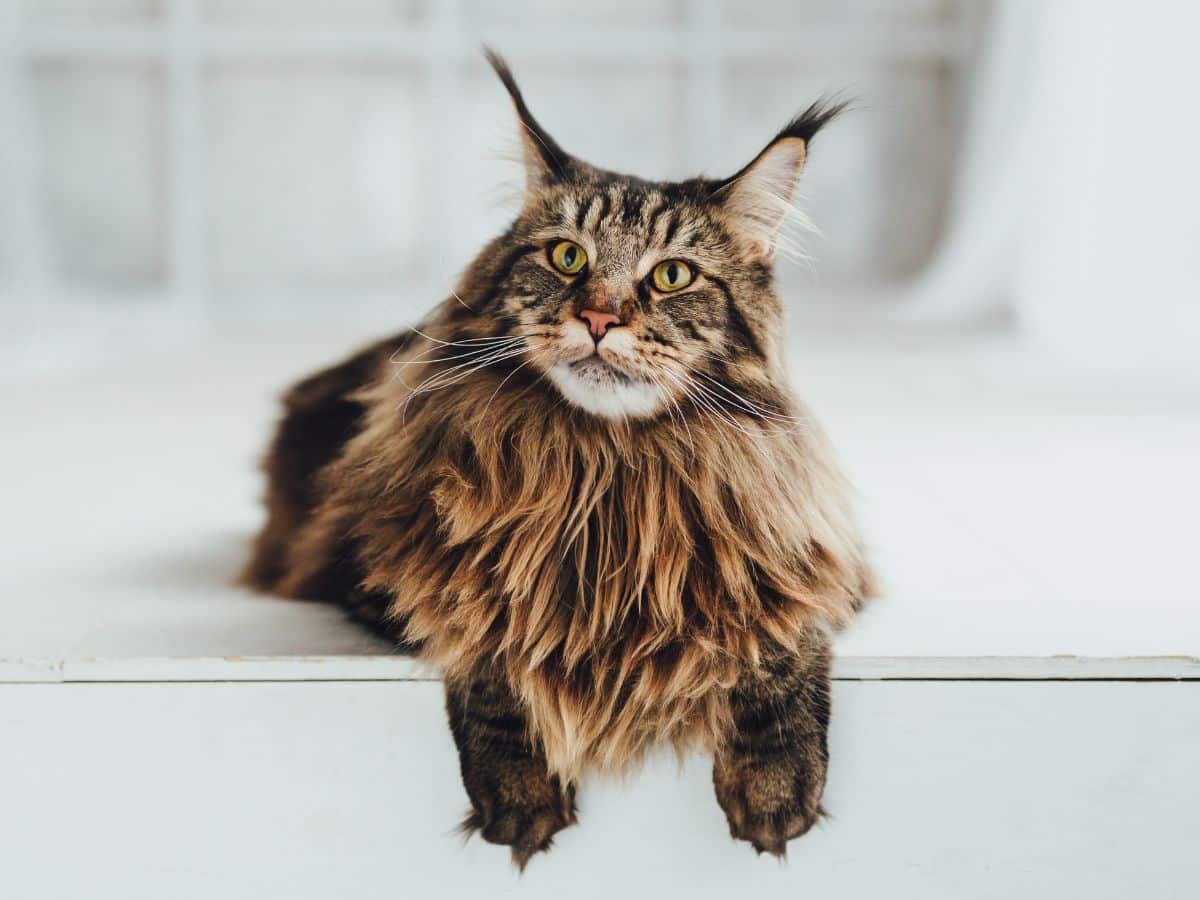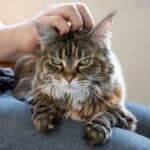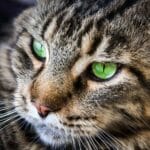The lovable giant Maine Coon cat is a generally healthy and hardy breed of cat. There is some data that suggests that the average life span of these cats ranges anywhere from 10-12.5 years while other data reports that these cats can live up to 15 years and beyond.

Of course, with the proper care, the life expectancy of these cats can be extended. While they are a generally healthy breed as with all cats, diet, exercise, and general health care are going to play a role in how long the cat lives.
There are some genetic diseases that the Maine Coon cat is prone to, but regular check-ups and early interventions can help to increase life expectancy. Your cat will require regular vet checks and vaccinations. Should a problem be present if it is caught early on through blood work there is a better chance of curing the issue?
Diet
The number one thing you can do to make sure that your Maine Coon cat stays on the longer end of the expectancy rule is to feed him/her a diet that is fat-free and that is sourced from a high-quality dry mix. Ensuring that the cat is not overfed is key to a healthy cat.
These are big cats and to keep their bodies healthy they need special attention to their diet. Speak with your vet about the right diet for your Maine Coon Cat. They can make recommendations about food type and amount.
Exercise

Cats--especially the Maine Coon--are very intelligent animals that can survive without human intervention, so for your cat to remain healthy and have the will to live as long as possible they need to be physically and mentally stimulated.
That means conversations, attention, toys, and play are all an important part of your cat's life expectancy. Purchase toys that are stimulating and that you can enjoy together. Oddly enough, Maine Coon cats are known for being able to be leashed and walked like a dog. This is a great form of exercise for the cat. Keep the exercise and play interesting to engage the cat.
Life expectancy is dependent on genetics and on the care that the cat receives. Sometimes even genetics can be outsmarted by the proper care.
FAQs
Maine Coon cats have a similar life expectancy as regular cats, though all cat breeds have slightly different lifespans based on common health issues, size, and other factors, so there can be slight differences.
When you compare Maine Coon cats with other cats, they are on the lower end of the lifespan spectrum and have a lower upper-end life expectancy. An average Main coon cat could live to be anywhere between 10-15 years old.
Compare that to Selkirk Rex cats which also live to be 10-15 years old. Siberian cats live to be 10-18 years old, so they can live on average longer than Maine Coon cats.
British Shorthair cats can live to be 14-20 years old, which starts putting them in a much higher spectrum of life expectancy than regular Maine Coon cats.
The oldest officially recorded Maine Coon cat by the Guinness Book of Records was Corduroy, a 26-year-old Maine Coon from Sister, Oregon. Corduroy was adopted in 1989 along with his brother Batman who lived to be 19 years old.
Unfortunately, Corduroy ran away in 2016 and was never seen again, he is presumed dead, and his official age at presumed death was 26. No other Maine Coon has been registered as older than Corduroy, so the position is now up for grabs.
The oldest Main Coon cat that was unofficially recorded was Rubble, a 31-year-old Main Coon from Devon in England. Unfortunately, rubble passed away in July 2020. Rubble lived with an adopted cat sister named Meg, who lived to be 25 years old.
So it’s interesting that Maine Coon cats live on average to be 12.5 years old, but many live much longer and often with the same owners. Which would indicate environmental factors that lead to longer potential life for Maine Coon cats.
Maine Coon cats are susceptible to a number of genetic diseases, more so than other standard cat illnesses or problems. Some of the most common illnesses include:
Heart disease which can be checked for early and preventative measures implemented.
Patellar luxation which is a bone disease or issue affecting the joints, specifically the knee slipping out of place. Without treatment, this can lead to your cat becoming lame.
Hip dysplasia which causes arthritis and pain as a result of a malformation of the hip joints. This can be treated early to slow progression; however, untreated can lead to your cat becoming lame, even as early as six months old.
Some of the biggest contributors to Maine Coon cats are obesity, dental health, bacteria and viruses, and parasites. Many of which can be controlled or helped through management and vet visits for regular teeth cleaning, vaccinations, and check-ups.
One of the most special or unique things about Maine Coon cats is their size. They are the largest domesticated cat breed worldwide. They can also take longer to grow into their full size than regular cats, often taking a full 3-4 years before they’re fully grown.
An average cat can weigh up to 8 - 10 pounds, while a fully grown Maine Coon cat can weigh up to 25 pounds. Making them, in some cases, more than double the size of any other cat you’ve seen before.
Additionally, Maine Coon cats can grow to be 10-16 inches in weight, while an average cat will only grow to be 9-19 inches.
How old your Maine Coon cat is in human years is dependent on how many real human years they are. The first two years of your Maine Coon cat's life are considered to be equal to the first 25 years of a human's life.
Once they’ve completed their first two human years, it’s averaged that each human year is equivalent to 4 cat years.
So if your Maine Coon cat lives to be 12.5 years old, then they’ve reached 67 years old, which is a pretty respectable age. The oldest recorded Maine Coon cat was 26 human years old, which makes them 121 years old when they disappeared.
Maine Coon cats pass through a few different stages in life; up until about nine months old, they will have the attention span of a 2-year-old and play as rough as they can until they fall asleep like a typical baby kitten.
At about nine months old, a Maine Coon cat may start to develop to recognize and meet you at the door when you come home, and once you sit down, they will jump into your lap.
Sometime between 7 months and 1 ½ year they will develop into typical teenagers, being very independent and standoffish towards you. They may not be as interested in cuddling or sitting on your lap and will not want to be picked up.
Many believe that Maine Coon cats do not develop into full adults until they’re 4-5 years old, which is shortly after they reach their full size, so prior to that, many consider them to be large kittens.
Because Maine Coon cats don’t fully develop or grow to their full size until around 3-4 years old, their appearance can change dramatically. The typical fluffy appearance that many associate with Main Coon cats may not fully develop until they reach their full size.
You may also find that your Maine Coon cat is not pure-blooded, and at some point in history, there was a mix with a regular short-haired cat, which would mean that your large Maine Coon cat will never get fluffier due to the short-haired cat genes.
However, you will notice a change in your Maine Coon cat once they reach around 4-6 months old, as this is when the fluffy tail and main start to develop. So if their tail and main aren’t fluffy at this point, you may not have a fluffy Maine Coon cat in the future.




